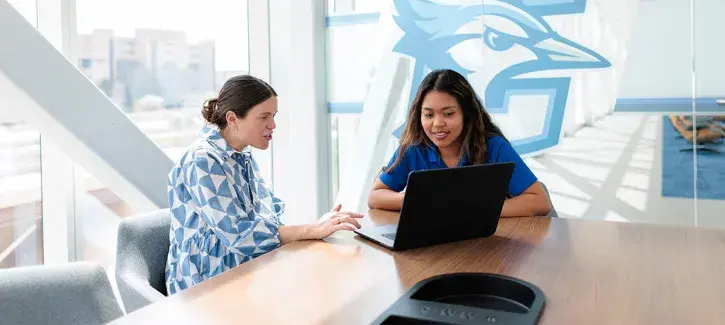
How to Obtain a Strong Letter of Recommendation

Expert strategies for securing strong recommendations for OT, pharmacy and PT school
Applying to occupational therapy, pharmacy or physical therapy school can feel overwhelming, especially when it comes to securing letters of recommendation. These letters carry significant weight in admissions decisions and often serve as the deciding factor for students on the bubble. The good news? With proper planning and strategy, you can obtain strong recommendations that highlight your potential as a future healthcare professional.
“We’re not just admitting them into Creighton. We’re admitting them into our profession,” explains an admissions committee member. This perspective underscores why letters of recommendation matter so much — they provide insight into your character, work ethic and suitability for a healthcare career that admissions committees can’t glean from grades alone.
Understanding the Weight of Recommendations
Letters of recommendation typically account for 10-15% of your overall application evaluation, according to Stefany Shaibi, PT, DPT, EdD, OCS, GCS, associate professor and chair of the admissions committee for Creighton’s Doctor of Physical Therapy program in Phoenix. While most letters tend to be positive, it’s the negative ones that raise red flags and prompt deeper investigation.
“The applicant doesn’t see them, so they’re pretty honest,” Shaibi notes. This confidential nature means recommenders can provide authentic assessments of your abilities and character.
Kathleen Flecky, OTD, OTR/L, an associate professor who has served on occupational therapy admissions for over 10 years, explains how letters fit into the holistic review process. “We look at our candidates holistically using a rubric filled out by at least two admissions committee members. Letters of recommendation are significant if someone’s on the fence — they can provide the context that tips the decision.”
Learn more about a holistic approach to applying to professional school
Letter Requirements for OT, Pharmacy and PT School Applications
Most health sciences programs require three letters of recommendation with specific professional requirements. For applicants to Creighton:
- Physical therapy programs typically require at least one letter from a practicing physical therapist.
- Pharmacy programs strongly prefer at least one letter from a pharmacist.
- Creighton's occupational therapy program prefers that one letter come from a college professor who can attest to your ability to enter a competitive professional program. If you have been out of school for some time, letters from a work setting can be helpful.
Make sure to confirm the specific requirements of each program to ensure you provide what they need. For instance, Creighton's occupational therapy program prefers one letter from a college professor who can verify your ability to succeed in a competitive professional program. If you have been out of school for a while, letters from a work environment can also be beneficial.
Kelly Nystrom, PharmD, BCOP, an associate professor who has served on Creighton’s pharmacy admissions committee for over 20 years, emphasizes the importance of this professional perspective. “If we don’t see any letters of recommendation from pharmacists for students who work in a pharmacy, that’s always a red flag. Pharmacists can address work performance and how you interact with patients, while faculty members can better address academics.”
The remaining letters should come from professors, supervisors or other professionals who can speak to different aspects of your character and abilities. Flecky stresses choosing recommenders strategically: “We want to see a portrait of that student — someone who can describe not only their character, but their skill set, hobbies and personal characteristics that relate to being a healthcare provider.”
Timeline for Health Sciences School Letter Requests
The most crucial advice from all three faculty members focuses on timing, but there are two distinct timelines to consider:
- Relationship Building: Begin cultivating professional relationships 5-6 months before you need letters. This allows you sufficient time to develop meaningful connections through regular shadowing, volunteering or working.
- Request: Ask for the actual letter 3-4 weeks before your deadline, giving recommenders adequate time to craft thoughtful responses.
“This is probably really a minimum three- to four-month process of you getting to know the person a little bit in the clinic and developing that relationship, and then a month before you need the letter is when you ask,” Shaibi explains.
Don’t underestimate the relationship-building phase. Shaibi recalls reading letters where recommenders wrote, “I literally knew this person for four hours, and they asked me to write a letter.” Such recommendations carry little weight and may harm your application.
Building Meaningful Professional Relationships
Quality outweighs quantity in building relationships with potential recommenders. For healthcare professionals, ongoing engagement proves more effective than single interactions.
“You don’t necessarily have to work a part-time job to get to know them,” Shaibi notes. “If you shadow once a week for a couple of hours for a few weeks, you get to know the person. That’s a better time to approach them about writing a letter.”
For professors, engage meaningfully in class and keep in touch with recent instructors who remember your work. Reach out to professors from relevant coursework such as anatomy, physiology or psychology who can speak to your academic abilities in science-heavy subjects.
Who Makes a Strong Recommender?
Beyond the required professional recommendations, consider these potential letter writers:
Strong choices include:
- Supervisors from part-time jobs who can address work ethic and interpersonal skills
- Volunteer coordinators from organizations where you’ve contributed significantly
- Academic advisors or professors from relevant coursework
- Coaches or activity supervisors who can speak to leadership and teamwork abilities
Avoid these common pitfalls:
- Family members, even if they are healthcare professionals
- Family friends, regardless of their impressive titles
- Anyone who doesn’t know you well in a professional capacity
Nystrom shares a cautionary tale: “In the past, we have had someone apply who had their father-in-law write their letter of recommendation. His recommendation does not carry more weight because he’s a physician, and it carries less weight because he is a relative.”
The exception? If a family member employed you in their practice and can speak to substantial professional experience, that might be appropriate, but transparency about the relationship is essential.
How to Ask Professors and Healthcare Professionals for Recommendations
When you’re ready to make the request, be strategic and direct in your approach. Face-to-face conversations often work best, followed by email confirmation with details.
“If they come to my office to ask for a recommendation, they’re much more likely to get a strong letter because I remember that student versus just sending an email,” Flecky notes.
The key question to ask is: “Would you be willing to write a positive letter of recommendation for me?” This phrasing enables potential recommenders to decline gracefully or address any concerns upfront.
“We tell our pharmacy students who are applying for residency that they should always ask for a positive letter of recommendation,” Nystrom explains. “This gives the person the opportunity to either say no or explain what they might need to address.”
Learn more about the importance of shadowing
Best Practices for Professional School Application Letters
Once someone agrees to write your letter, set them up for success by providing:
- Your current resume highlighting relevant experiences
- Information about the specific program and your career goals
- Clear deadlines and submission instructions through the centralized application system
- Guidance on which qualities you’d like them to emphasize
“Give them some direction,” Nystrom suggests. “You can say, ‘I’m asking you as a pharmacist I’ve worked with, so can you focus on my work performance and patient interactions,’ versus asking an instructor to focus on academics and problem-solving abilities.”
Flecky recommends ensuring your recommenders understand your chosen profession. “There are a lot of people who still don’t know what occupational therapy is. Ask them, ‘Do you know anything about occupational therapy? Can I give you some information so you can write a good letter?’”
What Admissions Committees Look for in Recommendation Letters
Admissions committees look for specific evidence of your potential success:
- Professional characteristics: Examples of empathy, adaptability, ethics and communication skills in action
- Academic indicators: Problem-solving abilities, intellectual curiosity, resilience through challenges
- Personal qualities: Leadership instances, teamwork examples, organizational skills
- Passion demonstration: Clear commitment to the healthcare field
“I like to hear about the personal traits that they think will make this applicant succeed,” Shaibi explains. “Passion, drive, motivation. Overcoming hardships shows drive and motivation. Organizational skills matter because PT school is not the easiest.”
Strong letters include specific examples rather than generic praise. Nystrom explains the difference: “If the employer checks excellent for everything and there is nothing really substantive in the letter, it tells me they are well-liked at work but that the recommender probably isn’t truly assessing the candidate, and this doesn’t give me the confidence to make a decision about the candidate’s ability to be successful in our program.”
Flecky appreciates letters that provide concrete scenarios: “Some of the most powerful ones include specific instances — maybe how a student handled a challenging patient interaction or improved a workplace procedure.”
Application Timeline Context
Understanding when applications open helps with planning:
- Physical therapy (PTCAS) applications typically open in mid-June
- Occupational therapy (OTCAS) and pharmacy (PharmCAS) applications typically open in mid-July
- First interview rounds often begin in September or October
“The nice thing about our timeline is there’s still plenty of time even if you start looking at recommendations when applications open,” Shaibi notes. “Letters of recommendation are probably the thing that takes the most time for the application, but you don’t need everything submitted on day one.”
Learn other expert tips for applying to professional school
Common Mistakes to Avoid
Several missteps can undermine even well-intentioned letters:
- Generic content that could apply to any student
- Wrong school names in letters (always specify your target program)
- Last-minute requests that force superficial responses
- Inappropriate recommenders who lack professional insight into your abilities
Expressing Gratitude
After recommenders submit their letters, express genuine appreciation. A handwritten thank-you note still makes a strong impression.
“As somebody who writes a lot of letters of recommendation, if you have 10 students asking you for letters, it’s a time commitment,” Shaibi notes. “A handwritten thank-you letter will go a long way.”
Professional School Application Strategy
Start identifying potential recommenders early in your undergraduate career. Build genuine relationships with professors, seek meaningful healthcare experiences and maintain professional connections. Remember, authentic relationships matter more than impressive titles.
“I would take a letter from someone who knew you longer and maybe was your supervisor over time than a healthcare professional you spent one four-hour session with,” Flecky emphasizes. “Quality and the amount of time that person has known you is most important.”
Letters of recommendation offer unique insights into the personal qualities that distinguish exceptional healthcare professionals. By engaging in thoughtful relationship-building, strategic planning and making professional requests, you can obtain recommendations that strongly advocate for your admission and future success in healthcare.
The investment required for strong letters mirrors the commitment needed for healthcare careers, making this process valuable preparation for the professional relationships that will define your career.




